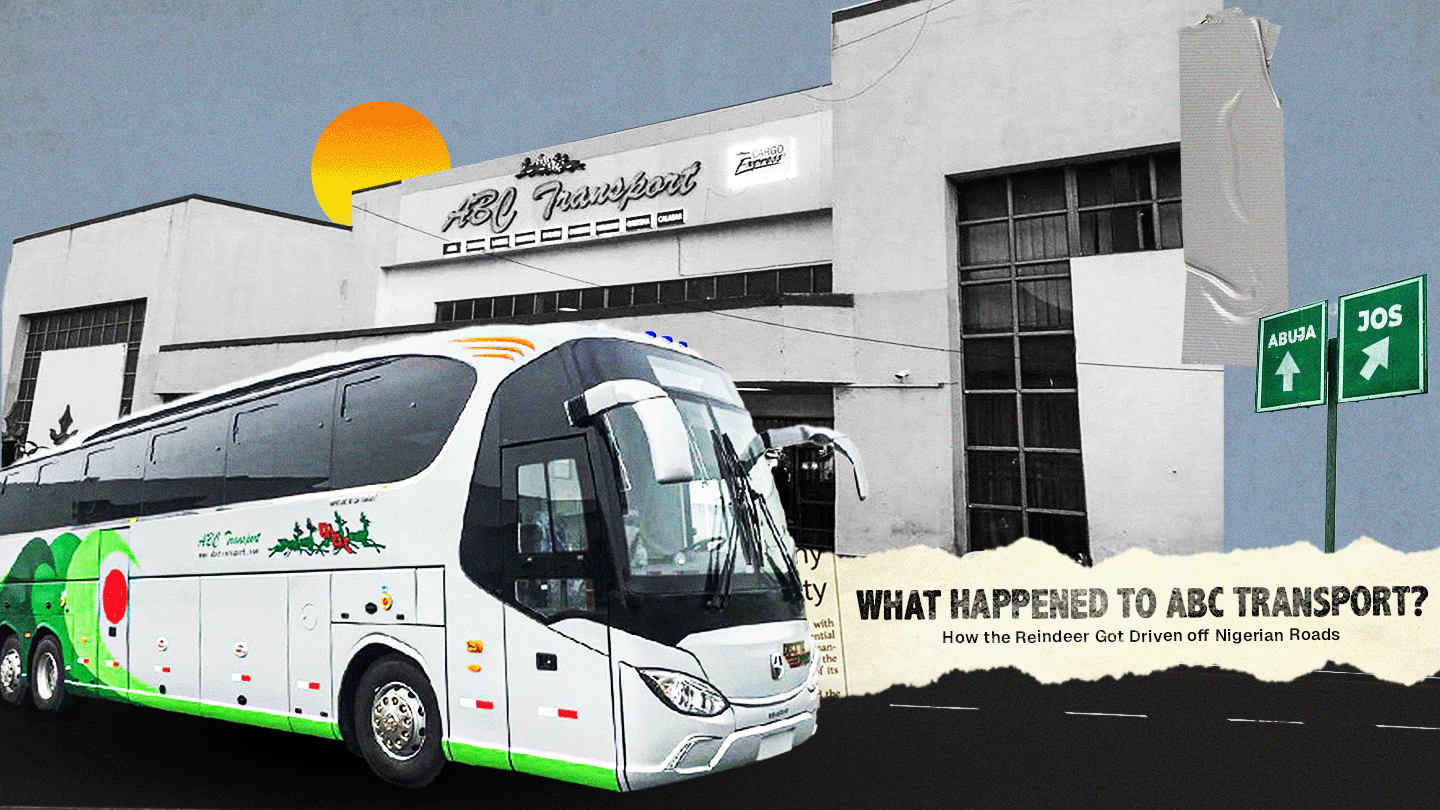How the Reindeer Got Driven off Nigerian Roads
Dubbed with the company’s trademark, the Reindeer, ABC Transport was the go-to luxury bus service provider for many Nigerians travelling in the late 1990s and early 2000s. However, in recent years, the company’s buses seem to be missing on Nigerian roads, begging the question, where did all the reindeer go? If you ask me, I’ll say they all returned to Santa in the North Pole, but that would be a bad ‘dad joke’. So let’s dive in and try to figure out what really happened to the former king of Nigerian roads.

In the course of speaking with people for this story, I realised that they were two kinds of people: the nostalgic ones who excitedly recounted their experiences with ABC, and those who seemed to live under a rock as they had no idea about ABC. One of the former was Nwando Ezeanowai, an Anambra-based medical student at Bowen University. She shared:
‘It [ABC] was the biggest thing in the East back when I was younger. As a kid we used ABC to travel everywhere. They had these luxurious coaster buses with TVs, ACs and everything. My grandmother lives in Jos, so we would use ABC to Abuja from Onitsha and then she would come and get us from Abuja. Though it was on land, it used to feel like entering a plane’
As for me, I only knew about ABC because of a singular experience from my teenage years, so maybe I should give the sub-rock inhabitants some more grace. The year is 2013 and it is the second-term holiday, or what we refer to as the Easter holiday. We are taking a family trip to Ghana and there are two options: travel my air or by land. My aunt suggests traveling with ABC transport, as she was one of their number one customers back in the day. At the time, luxury buses were something of a nightmare to me even though I had never been in one, as I had this (probably) irrational fear that they would tip over on bad roads. However, the D-day came and what I thought would be a nightmare ended up being the most comfortable road trip I have experienced till date. The interior of the ABC bus was top tier, akin to what I would see in a plane. Plus, the smoothness of the ride honestly made me feel like I was cruising in the sky.

After riding with ABC in 2014, I became more conscious of their luxury buses during my road trips. But as the years went by, the number of ABC buses I spotted began to dwindle. I can’t even remember the last time I spotted one on the road. To understand where all the reindeer went, we have to go back to the beginning.
THE GENESIS
The late 1990s and early 2000s made up the Golden Age for the use of luxury buses for transportation in Nigeria, with ABC and Chisco transport companies being at the forefront. The story behind ABC transport begins in 1983 with a man called Frank Nneji, the founder and Chief Executive Officer (CEO) of ABC Transport Plc. A 24 year-old Frank Nneji had just completed his NYSC when he started his multifaceted company, Rapido Ventures. Ten years later, the first iteration of ABC Transport Plc was launched as an off-shoot of Rapido Ventures.

Nneji started what we now know as ABC Transport with 1.5 million naira, a huge sum of money at the time. He obtained this capital by taking a loan from Diamond Bank and used it to lease five Toyota Hiace buses to start up his business, which he named The Associated Bus Company (ABC). The motivation for the creation of ABC Transport was the discomfort he constantly experienced while traveling interstate during his early business trips. During one of his uncomfortable journeys, he began to ponder the poor management of the road transportation sector and decided that he would be a solution provider. With ABC Transport Plc, Nneji pioneered modern transportation in Nigeria and became the first transport company to have the Public Liability Company (PLC) status. He also popularised the luxury bus service on the West African coast.
On February 13, 1993, ABC Transport Plc commenced operations in road passenger transportation within Nigeria and then later expanded beyond the shores of Nigeria to Ghana. Some of the cities ABC transport covered include Lagos (Jibowu & Amuwo-Odofin), Aba, Owerri, Port-Harcourt, Abuja, Enugu, Onitsha, Umuahia, Jos, Mbaise, Bolade, and Accra (Ghana). On the way to any of the aforementioned destinations, ABC transport had ultra-modern terminals, with comfortable lounges to rest in between journeys. The customer service of ABC transport was simply top notch, according to my aunt Adeola Oladokun, who resides in Lagos but frequented Abuja back in the day because her husband worked there at the time. She relied on ABC Transport for most of her trips and had a lot to say:
‘I started using ABC transport about 17 years ago because it was adjudged to be the safest transport company to travel within and outside the country at the time. When I didn’t have money for a flight, I simply bought an ABC ticket. I preferred to use their luxurious buses because of the toilet facility, because I would usually travel with my children. The service was very good and they served food. The comfort was unmatched.’

Over the years, ABC has won multiple awards for their great customer service, with one of these being the National Bus Operator of the Year Award presented to them by the Nigerian Chartered Institute of Transport. A recurring theme I could deduce from all my interactions is that ABC was considered the safest and most comfortable transport service back in the day. However, things began to take a downturn as time went on.
THE TURNING POINT
ABC’s expansion was outright mind blowing. A company that had initially begun with just 5 leased buses had suddenly taken over Nigeria as the number one transport service, with its tentacles extending to other West African countries like Ghana and Benin Republic. ABC’s selling point had always been punctuality, passenger comfort and safety. But as the transport company expanded, quality control seems to have been difficult to maintain. I remember ABC giving me a great journey in 2014, but the case is not the same for some others, especially in the later years. Yila Umaru a medical student who used to travel with ABC recalled:
‘ABC was the main deal in the past and I made use of their services a couple times. But as time went on, the buses became old and I don’t think they were replaced. The last time I used ABC, it was one of their sprinter vans and petrol seemed to be leaking into the cabin of the car, which made me very nauseous. That was the last time I used ABC transport. I just started flying after that experience, although the general lack of safety on Nigerian roads also played a part’.

Nwando Ezeanowai’s mum, Vivian Ezeanowai also had her own theories as to why the company started to lose ground:
‘I started making use of ABC as far back as 2004 and at that time it was the best and safest. In the early days it was near perfect. They were well organised and kept to time, which to me was very important as a business-oriented person. But as time went on, the buses became old and began to break down on the road. Their staff became lousy and most importantly, they stopped keeping to time. My last experience with them in 2014/15 was what broke the camel’s back for me. We were to leave Onitsha by 7am but ended up leaving by 11am. I would have cancelled my trip that day, but I needed to be in Abuja by the next day for something important. The bus that was eventually brought was in bad condition and we eventually got to Abuja by past 12am’
ABC transport was founded on the principle of punctuality and comfort, but it seems that as soon as these core principles went flying out the window, so did their loyal customers.
The Rise of Other Transport Services
Today, Nigeria’s highways have been taken over by other Transport companies like God is Good Mobility (GIGM) and Peace Mass Transit. God is Good is one transport service that I am very familiar with. Holidays in my adolescence were usually spent in Lagos and the go-to transport service for my family was GIGM. We occasionally boarded at the GIG terminal located close to the Onitsha Bridge. God is Good Mobility, formerly known as God is Good Motors, was founded by the enterprising couple Edwin and Stella Ajaere in 1998 and operations began almost immediately in Benin City, Edo State. However, Edwin Ajaere was kidnapped and subsequently killed in 2009. As a result, Chidi Ajaere, the son of Edwin Ajaere took over the administration of the company which led to a reinvention of the business in 2010.
In 2012, GIGM was awarded ‘Most Outstanding and Fastest Growing Motor Company’ for the year 2011 by the Nigerian Union of Journalists (NUJ). In the same year (2012), GIG Logistics began operations. The organisation has since grown to become one of the leading logistics companies in the country, with a network of over 100 offices and warehouses across Nigeria, and an expansive fleet of vehicles for transportation and delivery services. Ufuoma Omugbe, a youth corper and food vendor switched from using ABC logistics to GIG logistics because ‘they were swifter for me and had more pickup stations to choose from, one of which was very close to my house’. More so, ABC had previously messed up her order by delivering to the wrong pickup station, making her ‘waste transport fare’.

2019 was especially a big year for GIGM. They rebranded and a name change followed. Additionally, they expanded to Ghana with operating terminals in Accra and Kumasi. Over the years, GIGM has grown to become one of the largest intercity transport companies in Nigeria, with more than 5000 employees. GIGM also invested heavily in technology which made booking trips or tracking packages seamless and easy. Today, most people want to sit in the comfort of their home to get things done and GIG leveraged on this. They are definitely not the only transport company to integrate technology into their affairs, but I guess they hacked the code better.
All things considered, ABC seems to have fallen off due to an inability to maintain the many branches that were spread across Nigeria. The lack of maintenance culture was quite apparent as there was a recurring statement from our sources about decrepit buses. More so, on the topic of safety, Nigerian roads are now plagued with insecurity. Nowadays, travellers would rather travel by air than risk travelling by road over long distances and ABC was known for covering long those distance journeys like the popular route of Onitsha to Abuja. I obtained a number on their official site which I called in an attempt to book a trip, but I was on hold for about 2 minutes before I eventually cut the call. The Reindeer is still very much active but has become a shadow of itself as it no longer rules Nigerian travel routes.










